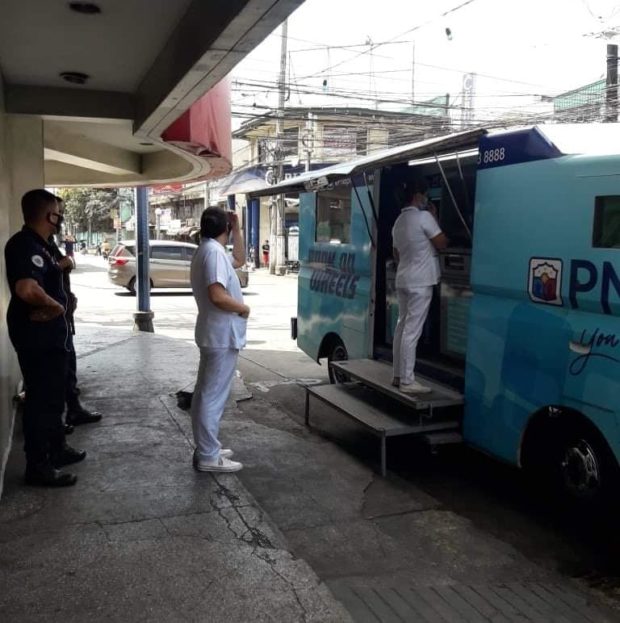
PNB’s Bank on Wheels
As the Luzon-wide lockdown has limited people’s mobility as part of measures to contain the coronavirus pandemic, a few banks have deployed “banks on wheels” or pop-up outlets to bring much-needed cash and other banking services to various communities.
Aboitiz-led Union Bank has deployed 5G mobile banking kiosks to different areas across the country while Philippine National Bank’s long-running “bank on wheels” has taken a more active role during the enhanced community quarantine.
Rizal Commercial Banking Corp.’s (RCBC) mobile point-of-sale program ATM Go, a neighborhood automated teller machine (ATM), has positioned itself to help disburse the government’s cash assistance for the poor.
RBCB’s ATM Go
The country’s largest bank, BDO Unibank, has also deployed its “ATM on Wheels,” allowing bank clients to perform various transactions like balance inquiry, cash withdrawal, cash advance, BDO cash card reload, prepaid mobile reload, fund transfer, donation, activation of online banking enrollment, third party fund transfer and pin change.
“BDO is positioning ATM on Wheels in areas where our branches are closed or in areas where there are no nearby ATMs,” BDO said.
BDO’s “ATM on Wheels”
Rolled out early this month, Union Bank’s “bank on wheels” is a 5G-powered airconditioned banking kiosk in a mobile van that enables customers to avail themselves of banking services such as balance inquiries, withdrawals, bills payments, funds transfer and even account opening, without leaving their communities.
Union Bank’s Bank on Wheels
With 5G technology, Union Bank relies on higher bandwidth and faster internet connection—20 times faster than other networks available. Among others, the bank targets people awaiting the release of pension from the Government Service Insurance System (GSIS), which releases the monthly pension electronically through electronic cards issued by either Union Bank or Land Bank of the Philippines.
“Banking services are among the most essential services for many people. However, access to these services has been very limited because of the health crisis that we are currently facing. By deploying a mobile banking kiosk that is powered by 5G technology, not only are we able to make banking more accessible to customers, we are also able to do so in a way that is faster and more efficient,” Aguda said.
For its part, PNB first introduced its “bank on wheels” in the summer of 1973, then in the form of a Toyota vehicle that brought banking services to farmers from the rice-producing provinces in the country. Through gravel roads and amid rice fields, transactions are done on the nearest place of convenience: a big shady tree, a barber shop and even inside a chapel.
PNB’s program allows Filipinos to perform transactions such as cash withdrawal, cash deposit, bills payment, and fund transfer in areas deemed most in need of these services. Last April 3, for instance, PNB’s bank on wheels was stationed at the Lung Center of the Philippines.
“We hear the plight of our kababayans. Our Bank On Wheels is ready to serve them especially in these most difficult times. We deploy this in areas where accessibility to cash is limited. Since the start of the Enhanced Community Quarantine, we have been servicing many communities in Metro Manila. Each day, our Bank On Wheels is sent to a different location to serve those who have difficulty in getting to an ATM,” PNB president and CEO Wick Veloso said.
RCBC’s ATM Go is a digital facility capable of accepting BancNet debit and prepaid cards issued by any financial institution supervised by the Bangko Sentral ng Pilipinas. This may be used for cash withdrawal, balance inquiry, funds transfer, bills payment, and e-loading transactions.
The bank has 1,250 existing ATM Go terminals currently in use nationwide.
Additional 2,000 units will be deployed to flesh out the “Damayang Sambayanihan: Hatid-Ayuda sa Kababayan collaboration with Rural Bankers Association of the Philippines (RBAP), MASS-SPECC Cooperative Development Center (MASS-SPECC), National Confederation of Cooperatives (NATCCO) and CIS Bayad Center to help disburse over P200 billion in financial assistance that the government will provide to the poorest households.
RCBC has been running the ATM Go service for the past two years, enabling rural banks, sari-sari stores, cooperatives, microfinance institutions, pawnshops, and lending agencies to provide remote ATM services as a last-mile approach.
President Rodrigo Roa Duterte recently signed into law Republic Act 11469 or the “Bayanihan to Heal as One Law,” which includes a social amelioration program granting emergency subsidy of P5,000 to P8,000 to 18 million low income households all over the country.INQ